- Home
- Micheal Maxwell
Soul of Cole Page 3
Soul of Cole Read online
Page 3
Soon they found themselves going for walks and having long talks about America, Oklahoma and the traditions of the Cheyenne people. She explained the difference between Shiite and Sunni Muslims, and how it was political, not religious. Michael listened intently, not because he was interested, but because Miriam was speaking. He could have happily listened to her talk about anything for hours. He held no religious beliefs and hers had no bearing at all on his growing love for her.
During the eighteen months he served in the town, they fell deeper and deeper in love. They would find time and places to steal away and talk, laugh, eat, and eventually make love.
Shortly before the anniversary of his first year in Iraq, Miriam came to him with the news that she was pregnant. He went to his commanding officer and requested the paperwork for them to be wed. Michael would bring her back to the United States.
“Don’t be a fool.” His commanding officer laughed off his request. “Find some nice Indian girl back in Oklahoma, and leave these people be.”
Try as he may, and even going over the head of his commanding officer, he found the army to be unwilling, uninterested, and frequently hostile toward his desire to make an Iraqi his wife and claim the child as his son.
As the time grew nearer for him to return to the U.S. and a different post, the couple panicked. Miriam grew larger by the day. The women of the village went from the shun of silence, to open distain for her. Some went as far as to throw rocks and rotten vegetables at her when she walked down the street. If she were left behind, life would be intolerable for her and their child.
They could no longer go for their walks due to Miriam’s condition. Her father, though enraged at her pregnancy, and even more so of her relationship with an American, allowed them to meet in his home.
It was on one of these visits Michael suggested he desert the Army and go into hiding in Iraq to be with her. Miriam was steadfast in her refusal. She knew far better than he it would be a death sentence for them both. Instead, she put her faith in his ability to work things out. He insisted they be married, and tried to find a magistrate in the town to perform a civil ceremony.
The law prohibited the union of a Muslim woman to a non-Muslim man. Michael’s anger grew hotter towards the army prompting his decision to abandon his plans for a military career. As his time for reenlistment neared he refused all offers, counsel, and pleading from his peers, as well as superior officers.
One evening he took Miriam to the outskirts of the small town. Beneath a cobalt sky filled with a million stars he performed as much of the Cheyenne wedding ceremony as he could remember, sprinkled with the words of preachers at the few Christian weddings he attended. Miriam spoke in Arabic, quoted the Koran, and translated the verses for Michael.
That night, before Allah, the Christian God, and the Great Spirit of the Cheyenne people, Michael Blackbear took Miriam as his wife.
When the baby was born, Miriam refused to name the little boy, saying that he would have an American name and they should wait until they were all together to give him the correct name. She found great honor in knowing her son would be a member of the Cheyenne tribe and would be given a name by the chiefs and elders.
Arriving back in the U.S., Michael tried many different channels to get Miriam and the boy a visa into the U.S. Because of the conflict in Iraq, and the quotient for Iraqi immigrants, his request was denied time after time. Back in Orvin, a friend suggested he go to Warren Poore, the Methodist pastor and founder of the Love, Laugh, Learn – Indian Children’s Center, to see if there was some way for him to help.
Pastor Poore’s first reaction as a Minister was to suggest that marrying a woman of another faith was a recipe for conflict in the marriage.
“Religion was for each one to choose.” Michael told Poore he cared nothing for religion. “I don’t care what she believes.”
“Does she wear Muslim head dress?” Poore went straight to the heart of his objection.
“Yes, but…”
“Can you imagine a woman walking the streets of Orvin looking as she did at home? In this town where we have lost so many young men to wars in the Middle East? Her presence would be far from welcome.”
“It would be almost as bad as being an Indian.” Michael Blackbear was losing his patience with the prejudice he was seeing. The people of the United States were willing to give the lives of their sons and daughters for the Iraqis, but unwilling to have them in their country.
“That’s not fair. We have made great strides in the coming together of our communities.” All Michael heard was an air of ‘look what I’ve done’ in Warren Poore’s response. Unfair or not, Michael was blinded by frustration and anger.
“So, are you saying that as an Indian?” Michael scoffed at Poore’s words. “No. You are still the kindly white man, still trying to teach little red children and their mothers the ways of the white world. Nothing has changed in two hundred years.”
Michael Blackbear’s words burned with the reality of growing up Indian in Orvin. Good enough to win football games, but not good enough to date white girls. The poverty and substance abuse of the reservation drove him from his home only to find a different kind of prejudice in the army for the people he fought for.
Michael left his first meeting with Warren Poore angry, confused and longing for a return to his life in Iraq. He would go home, calm down and write him a letter. Maybe that would convince Poore he was serious about bringing them home, Michael thought driving home.
“Descanso! Tomemos un descanso!” There were so many Mexicans and Central Americans working the construction job sites that the foreman no longer bothered to make announcements or call a “break time” in English.
Michael Blackbear walked to the west side of the house they were working on. It felt good to get out of the hot sun for a few minutes. He opened his large, yellow, insulated jug and took a long, slow drink of cold water. Several of his new co-workers came and sat around him on boxes and empty five-gallon paint buckets.
“Eres Indio?” Jesús, the unofficial leader of the group asked.
Michael Blackbear knew enough Spanish to answer “Cheyenne. Do you speak English?” he asked the man.
“A little.” Jesús nodded.
“Tell me something.” Michael began. “How did you get here?” The four men sitting with Michael all looked at each other. Finally, one nodded his head toward Jesús.
“Through the desert into Texas.”
“How did you know where to go?”
“Why you want to know?”
“I want to get someone into the U.S.” Michael looked the man in the eyes. He wanted his trust. He needed his help.
Jesús turned and spoke to his three comrades in Spanish. Again, they looked at each other trying to decide whether they could trust Michael Blackbear.
“You know Coyote?”
“I have heard of such people.” The ice was broken. Michael knew what a Coyote was, and he needed to find one.
“You need Coyote.”
“How do I find one?” Michael asked.
“Tomorrow, Mañana.”
“Is it expensive?”
“Mañana.”
An uncomfortable silence fell over the group. For the first time since he began working at the site, Michael felt alienated and not part of the crew. He wondered as he sipped his cool water if this was his answer to getting his family into the United States.
The rest of the afternoon the crew worked hard but, other than instructions or questions about what they were doing, there was little of the usual chatter and good-hearted teasing. As they knocked off for the day, Jesús walked past Michael and without stopping or turning his head, again said, “Mañana.”
Michael’s night was filled with restless sleep, dreams, and tossing. As he drove to the work site, he wondered if his crew would actually help him, or were they just using Mañana to put him off? As he pulled up to the house they were currently working on, the sound of Tejano music blasted from one of the
cars and the four members of the crew were standing around talking. As Michael approached the group they all separated. There was no longer a feeling of camaraderie and he wished he never mentioned their legal status.
“Good morning.” Jesús approached Michael.
“Buenos Dias.” Michael smiled. Maybe all is not lost, he thought.
“They are going to work on the roof. Me and you, we work on the siding.” Michael Blackbear did not question and followed Jesús to a stack of plywood. They worked without talking for more than an hour.
A white Chevy pickup pulled up onto the empty lot next to the house, stirring up a cloud of dust near where they were working. Two men sat in the truck and scowled out the window at Michael and Jesús. As if to give himself courage or a sense of well being, Michael put his hand on top of his hammer in his tool belt, like the hero in an old cowboy movie.
The passenger door of the truck opened and a small, thin man dressed in jeans, a white western shirt, a cowboy hat, and very pointy, lizard-skinned, cowboy boots got out.
“Jesús!” It wasn’t a greeting. It was a command to join the man.
The two men walked out of hearing distance of Michael and chatted for a minute or two. Then Jesús disappeared around the end of the building. A man approached Michael, and he gave an uneasy, soulless smile.
“So, I hear you need a friend.” He was not friendly and his words held the feeling of a veiled threat.
“I understand you are someone who can help me.”
“Help is expensive.” The words lost any hint of cordialness. “Where does a man who works here building a house get money for such help?”
“You let me worry about that. I can get the money.”
“So, who is this person you want to bring across the border?”
“My wife and my son. But, they are not Hispanic.”
“What do you mean?” The man gave an inquisitive look.
“They are from Iraq.”
“Chingada ese. Where the war is? You crazy?” The Mexican’s swearing showed a crack in his tough guy posturing.
“Yes. Can you help me?”
“This is totally new to me. I’ve never done such a thing.”
“Can you put me in touch with someone who can?”
The Mexican studied Michael Blackbear. Michael worried that his request was so far out of the ordinary that a small fish in the food chain like this guy, in his beat up pickup, might not want to swim in these waters.
“I didn’t say I couldn’t do it, I said I hadn’t done it. Let me talk to my people and see how it could be done. But, I can only get them across the border. You will have to get them into Mexico.”
“I’m not sure I know how to do that,” Michael said.
“Anything can be done for a price. Let me get back to you in a day or two. I’ll see what I can find out.”
“Thank you, I’m Michael Blackbear.” Michael offered his hand.
“No names. I will see you in a couple days.” The man did not shake his hand and returned to the passenger side of the pickup. The other man took the wheel dutifully.
The next two days and nights were spent thinking, planning and worrying if he had done something stupid. He was desperate to have Miriam and his boy with him, so it didn’t matter.
The morning of the third day it was nearing lunchtime when the white Chevy reappeared. This time it parked across the street and down the block. There were three short blasts on the horn and Jesús called out to Michael. “That’s for you”.
This time the small man was driving and the passenger side was empty. As Michael approached the truck, the small man said, “Get in”.
Michael’s heart pounded as he rounded the truck and opened the passenger side door. An automatic pistol lay across the man’s lap as Michael got into the truck.
“So, what did you find out?”
“It can be done, but it will cost $40,000. $20,000 now and $20,000 when I bring them to you.”
“That’s a lot of money, much more than I thought.”
“I thought you wanted them out of their country.” The man shrugged.
“I do, I do. I just…”
The Coyote reached up on the dashboard and took a card that was stuck into the air conditioning vent. “Call these people and they will help you with the money. When you have the money, call me again. My number is the red one.”
Michael took the card and read the number. The card was for a heating and air conditioning company. The words were scribbled through. The sight of the gun and phrase, ‘help you get the money’ written on the back made him very uneasy, but he was committed to having his son and Miriam back again.
“I’ll call you.”
“If you do, you do.” The man started the pickup.
Michael shoved the card deep into the pocket of his jeans and went back to work.
The plate of leftover chicken and potatoes held no interest for Michael. He sat and stared at the card on the table, and the telephone number with no name. He somehow knew he was about to make a deal with the devil. He put the number into his cell phone twice before he worked up the nerve to hit the green dial button.
The phone rang three times before a man’s voice said, “Hello”.
“I was told you can help me raise the money to get my wife and son into the U.S.”
“Who gave you this number?”
“He didn’t give his name. He’s a Coyote. White pick up, he wears lizard skin boots.”
“I don’t care what you do with the money, but yeah, I can help. Do you know the Chew’n’Chat just outside of Orvin? Meet me there tomorrow at 3:30. We will discuss the details.”
“How will I know who you are?”
“Don’t worry about it, I will figure out who you are.” With that, the line went dead.
In the late afternoon of the third day, Cole went with Kelly to pay a visit to Cassie Poore, the daughter of the murdered couple, to show their respect and offer condolences.
“My father has been depressed lately because the finances and the backing for the Center have been drying up.” The young woman sat on the couch in Russ and Sharon Walker’s living room. “People, who for many years were an integral part of my father’s ministry at his church, just aren’t interested in his new Indian charity. A lot of them, because of recent problems with the Indian community, were openly hostile towards dad. Old friends, people who have known him for years.”
Cole watched the girl closely as she directed most of her words at Kelly. She seems very together, he thought.
“Listen, I don’t know what people are saying but my father would never kill himself. He believes that suicide is the one sin you can’t ask forgiveness for. You go straight to hell. And the thought of him killing my mom? That is absurd. He loved her more than anything. Forty-one years they were married, no way, there is just no way.”
“I can’t imagine him doing it either.” When Kelly replied, Cassie looked down into her lap.
Cole spoke for the first time. “When was the last time you spoke to your folks?”
“The night before, they were…” Cassie glanced up at Cole for a brief moment then down to her lap. “They were all excited about my party. They were throwing me a twenty-first birthday party at the Center. My birthday is in three weeks.”
“I’m sorry.” Cole tried to sound more compassionate than he felt. He didn’t like the girl. Everything she said seemed to have an underlying selfishness in it.
“For what?”
“For your party being canceled.”
“Who said it was canceled? You’re only twenty-one once. It might sound harsh but I want that party. I have been waiting since I was sixteen. That other great landmark birthday, Sweet Sixteen, I didn’t get either. My sister got appendicitis, so my party got canceled and then forgotten.”
“Then I’m double sorry.” Cole was right; he really didn’t like this girl.
“Speaking of my sister, she’s flying in tomorrow. She’s a missionary you know, in Gu
atemala.”
“That’s wonderful.” Kelly was trying to distract from the obvious tension between Cole and the young woman glaring at him.
“That’s part of the problem with the lack of funds. I’m sure it was part of my dad’s worry and depression. All their money was going to support Rebecca as a missionary.”
On the way home, Kelly and Cole discussed the girl’s response to their questions and inquiries.
Cole asked, “Don’t you think the discussion of her sister was kinda weird? I think I detected a real resentment towards her.”
Kelly answered, “I don’t think at a time like this you can read much into a person’s responses. She’s obviously very upset right now at the loss of her parents.”
“Yeah.” Cole tasted his words. “But I didn’t get the impression that she was particularly excited about her sister’s arrival.”
CHAPTER 4
“Have you got the barbecue lit? They’ll be here any minute.”
“Yes ma’am, I did it about twenty minutes ago.”
“I’m excited to see what everybody thinks of this new recipe.” Kelly manically flew about the kitchen seeing to every detail, even the ones no one would notice. When she was in full-on hostess mode Cole tended to stay out of the way.
“It smells wonderful.”
Yakety-yak, Don’t talk back, Yakety-yak, Don’t talk back. Cole’s phone rang with the old Coasters hit to warn of an incoming call from someone not in his address book.
As the refrain repeated Kelly reminded him of the obvious. “Are you gonna get that?”
“I guess I have to.” Cole teased as he picked up his phone. “Hello.”
“Is this Cole Sage?”
“Yes it is. Who’s this?”
“This is Michael Blackbear.”
Cole realized it was the young, angry veteran he met at the Center. It took a moment for Cole to put the name with a face. It was several weeks since they met. Blackbear was having a shouting match with Warren that ended when he stomped out. Cole went into his, “let’s see what we can do” mode, and probably got more involved than he needed to. Cole thought back to that first meeting.

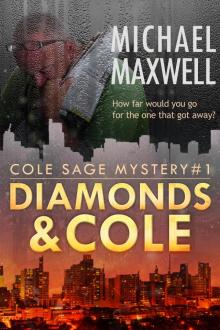 Diamonds and Cole: Cole Sage Mystery #1
Diamonds and Cole: Cole Sage Mystery #1 Dead Beat
Dead Beat![[Cole Sage 03.0] Helix of Cole Read online](http://i1.bookreadfree.com/28/cole_sage_03_0_helix_of_cole_preview.jpg) [Cole Sage 03.0] Helix of Cole
[Cole Sage 03.0] Helix of Cole Dupree's Rebirth
Dupree's Rebirth Dupree's Resolve
Dupree's Resolve Dead Duck
Dead Duck East of the Jordan (A Logan Connor Thriller Book 2)
East of the Jordan (A Logan Connor Thriller Book 2) Dead Beat (Flynt and Steele Mystery Book 1)
Dead Beat (Flynt and Steele Mystery Book 1) Dead Duck (Flynt & Steele Mysteries Book 2)
Dead Duck (Flynt & Steele Mysteries Book 2)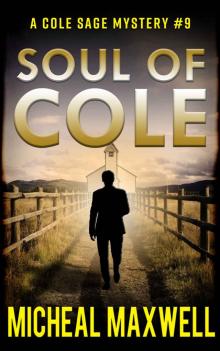 Soul of Cole
Soul of Cole Clean Cut Kid (A Logan Connor Thriller Book 1)
Clean Cut Kid (A Logan Connor Thriller Book 1)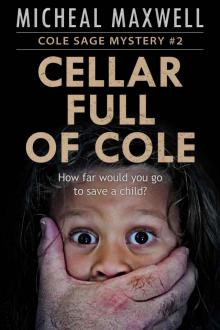 Cellar Full of Cole: A Cole Sage Mystery #2
Cellar Full of Cole: A Cole Sage Mystery #2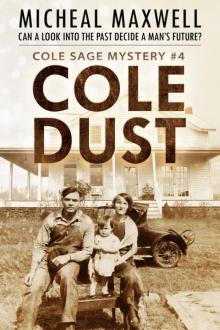 Cole Dust Cole
Cole Dust Cole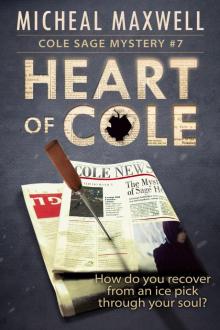 Heart of Cole
Heart of Cole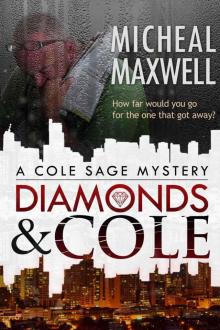 Diamonds and Cole: A Cole Sage Mystery
Diamonds and Cole: A Cole Sage Mystery Helix of Cole
Helix of Cole Cole Shoot
Cole Shoot